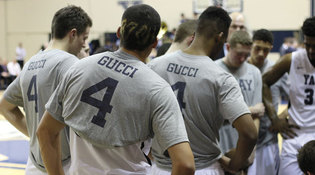 loading
loading
Light & VerityFormer basketball captain plans lawsuitThe senior says he was expelled over a sexual misconduct charge.  Robbie Short/Yale Daily NewsMembers of the men’s basketball team wore warmup shirts with the nickname and number of their former captain, Jack Montague ’16, before the February 26 game against Harvard. View full imageYale’s handling of sexual misconduct cases was in the media spotlight again in March. Just as the men’s basketball team was preparing to play in the NCAA Tournament (see page 40), an attorney for Jack Montague ’16, the team’s former captain, revealed that Montague had been expelled from Yale after a finding that he had had nonconsensual sex with a female student. Montague had left the team and withdrawn from Yale in early February, but he did not give a reason for his departure until after the February 26 game with Harvard. At that game, the team wore warmup shirts with Montague’s number and nickname (“Gucci”) and a backward Yale logo. Three days later, anonymous posters appeared on campus with pictures of the team wearing the shirts and the legend “Stop supporting a rapist.” (The team later apologized for wearing the shirts.) Although Yale would not comment on the reasons for Montague’s departure, citing privacy laws, attorney Max Stern released a statement on March 14. Stern wrote that Montague had been expelled on the recommendation of the University-Wide Committee on Sexual Misconduct (UWC) as a result of a complaint of nonconsensual sex brought by a female student. Stern claimed that Montague and the student had had consensual sex before. “She stated that she did not consent” to sex on the occasion in question, the statement reads. “He said that she did.” “We strongly believe that the decision to expel Jack Montague was wrong, unfairly determined, arbitrary, and excessive by any rational measure,” Stern continued. He went on to say that Montague plans to sue the university. Without referring to Montague’s case in particular, university spokesman Tom Conroy defended the fairness of the UWC’s process. “One out of five hearings before the UWC has ended without a finding against the accused,” wrote Conroy in a statement. “In two out of five cases, the accused student has received a reprimand or probation. About one out of ten cases has ended in expulsion, and the decision to expel a student is made only after the most careful consideration based on the facts.” Six students were expelled over sexual misconduct charges heard by the UWC from 2012 through 2015, according to semiannual reports published by the university. Four of the cases involved findings of nonconsensual sex; the other two were charges of voyeurism and “intimate partner violence.” The question of how sexual misconduct is investigated at Yale has been the subject of scrutiny over the last decade. In 2008 and 2009 a Yale committee and the Women Faculty Forum both issued reports recommending a campus-wide system, and in 2010 Yale created the University-Wide Committee. After 2011, when a group of students and alumni filed a complaint with the US Department of Education arguing that Yale had allowed a “hostile environment” for women on campus, Yale introduced a number of new steps, such as its public reporting system on sexual misconduct complaints and resolutions. But there is now substantial pushback against efforts by universities to comply with the Department of Education’s guidelines, which require schools to use a “preponderance of the evidence” standard in sexual misconduct cases. Dozens of lawsuits against colleges have been filed by students who feel they were unfairly punished. A Yale student who was expelled in 2014 after a finding that he had sex with a female student without her consent has filed a suit charging Yale with racial discrimination, gender discrimination, and breach of contract. The suit, whose plaintiff is listed as “John Doe,” is pending in federal court in Connecticut.
The comment period has expired.
|
|